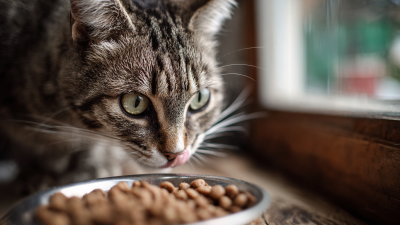Choosing the right pet food is crucial for the health and well-being of your furry companion. With more than 60% of pets in the United States categorized as overweight or obese, the importance of proper nutrition cannot be overstated. According to a report by the Association for Pet Obesity Prevention, pet obesity has nearly doubled in the last decade, leading to serious health issues such as diabetes, joint problems, and reduced lifespan. Additionally, the global pet food market is projected to reach over $100 billion by 2024, reflecting the increasing awareness and demand for quality nutrition among pet owners. Understanding the diverse range of pet food options available, from dry kibble to raw diets, and how they cater to the specific health needs of pets is essential. This guide aims to help pet owners make informed choices that support their companions' health and longevity by navigating the complex landscape of pet food.

Understanding your pet's nutritional needs is essential in choosing the right food for their health and well-being. Different pets have varied dietary requirements influenced by factors such as age, breed, size, and activity level. For instance, puppies and kittens need higher levels of protein and calories to support their growth, while senior pets often require diets that are lower in calories but rich in nutrients to maintain their health. It's crucial to assess these aspects to provide a balanced diet that supports their specific life stage.
Additionally, the ingredients in pet food play a significant role in meeting their nutritional needs. Quality proteins should be the primary ingredient, as they are vital for muscle development and energy. Carbohydrates, fats, vitamins, and minerals must also be present in the right proportions to promote overall health. Being aware of your pet's sensitivities or allergies can further guide you in selecting food that's not only nutritious but also safe. Taking time to research and consult with a veterinarian can ensure that the chosen diet will enable your furry companion to thrive.
| Nutrient | Importance | Sources | Recommended Daily Intake |
|---|---|---|---|
| Protein | Essential for muscle development and energy | Meat, fish, eggs, legumes | 20-25% of total diet |
| Fats | Source of energy and aids in nutrient absorption | Fish oil, chicken fat, flaxseed | 10-15% of total diet |
| Carbohydrates | Provides energy and aids in digestion | Rice, oats, sweet potatoes | 50-60% of total diet |
| Vitamins & Minerals | Supports various bodily functions and immune health | Leafy greens, fruits, supplements | Varies by specific vitamin/mineral |
| Water | Crucial for hydration and overall health | Fresh, clean water | Always available |
When selecting pet food, one of the most crucial aspects is carefully evaluating the ingredients. A quality pet food should list high-quality protein sources as the first ingredient, such as chicken, beef, or fish. This ensures your furry friend receives essential amino acids necessary for muscle development and overall health. Additionally, avoid products that list vague terms like "meat meal" or "by-products," as they can be less nutritious and may contain lower-quality ingredients.
Tips for evaluating ingredients include opting for foods that have whole grains like brown rice or oats, rather than fillers such as corn or wheat. Whole grains provide necessary fiber and energy, contributing to better digestion. Moreover, look for added vitamins and minerals that support your pet’s immune system and overall well-being. Natural preservatives, such as tocopherols (vitamin E), are preferable to artificial additives that can be harmful in the long run.
Incorporate a variety of ingredients in your pet's diet as well; this diversity not only keeps meal times interesting but also ensures a broad range of nutrients. Foods enriched with omega fatty acids can improve coat health and reduce shedding. Always check for potential allergens and consult with your veterinarian if you are unsure about the best choice for your furry companion’s specific needs.
This chart shows the percentage of common essential ingredients found in quality pet food. Choosing the right ingredients is crucial for your furry companion's health.
When selecting the right pet food, understanding your furry companion's age and breed is crucial. Puppies and kittens require nutrient-rich formulas to support their rapid growth and development. For instance, puppy food is often higher in calories and contains specific nutrients, such as DHA, which promote healthy brain and eye development. In contrast, adult pets need a balanced mix of protein, fats, and carbohydrates to maintain their energy levels while avoiding unnecessary weight gain.

Moreover, certain breeds may have unique dietary needs. Larger breeds, like Great Danes and Labradors, are prone to joint issues, so their food should include ingredients that support joint health, such as glucosamine. On the other hand, smaller breeds may benefit from higher energy-dense food to meet their metabolism needs. Tailoring your pet's diet to their specific age and breed can significantly enhance their health and longevity, ensuring they thrive with the right nutrition throughout their life stages.
When selecting the right pet food, recognizing common allergies and sensitivities is crucial to maintaining your furry companion's health. According to the Veterinary Nutritionist Council, up to 30% of dogs and 10% of cats may suffer from food allergies, with symptoms ranging from itching and skin irritations to gastrointestinal distress. Common allergens in pet foods include beef, dairy, chicken, and wheat. It’s essential to closely monitor your pet's reactions following the introduction of a new diet, as this can help identify potential food sensitivities.
Moreover, a report by the American College of Veterinary Nutrition emphasizes that many pet owners overlook the importance of diet in managing food allergies, often opting for grain-free options that may not address their pet’s specific needs. Instead, considering hypoallergenic food formulations, which often contain novel proteins and limited ingredients, can help minimize adverse reactions. Gradually transitioning your pet to a new food while observing for any signs of distress can be a prudent approach in ensuring their dietary requirements are met without triggering allergies.
When selecting the best food for your beloved pet, one of the most important steps is to consult your veterinarian.
 Veterinarians possess the knowledge and experience required to recommend diets tailored to your pet's specific health needs, age, and activity level.
Every pet is unique, and factors such as breed, size, and pre-existing health conditions can significantly influence their nutritional requirements.
By discussing these aspects with your vet, you can ensure that you choose a diet that promotes optimal health and well-being for your furry companion.
Veterinarians possess the knowledge and experience required to recommend diets tailored to your pet's specific health needs, age, and activity level.
Every pet is unique, and factors such as breed, size, and pre-existing health conditions can significantly influence their nutritional requirements.
By discussing these aspects with your vet, you can ensure that you choose a diet that promotes optimal health and well-being for your furry companion.
In addition to understanding your pet's individual needs, your veterinarian can guide you through the vast array of pet food options available on the market.
They can help you differentiate between high-quality and low-quality products, identify any potential allergens, and suggest appropriate portion sizes.
This personalized advice not only empowers you to make informed choices but also fosters a healthier lifestyle for your pet.
Regular check-ups with your vet can help adjust dietary recommendations as your pet grows and their needs change, ensuring that their diet always supports their health goals.






